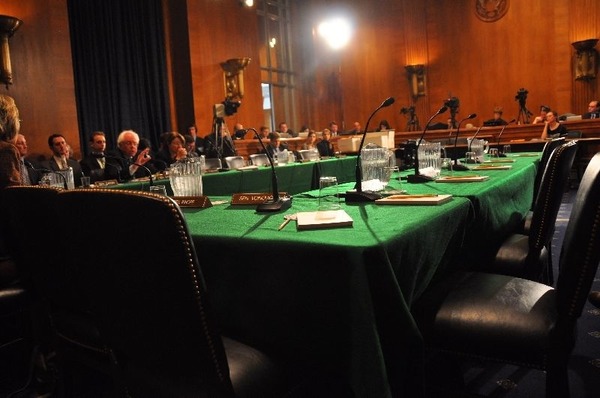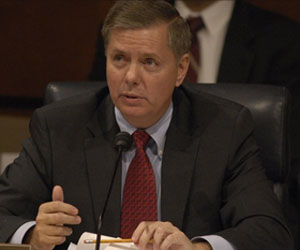With the climate bill stalled in the Environment and Public Works Committee, a bipartisan group of senators on Wednesday announced that they’re working on an alternative path to passing legislation.
Sens. John Kerry (D-Mass.), Joe Lieberman (I-Conn.), and Lindsey Graham (R-S.C.) said they are meeting with fellow senators and with administration officials to work out a proposal on climate and energy legislation that they will hand over to Senate Majority Leader Harry Reid. The proposal will incorporate the components of legislation being crafted within the various committees of jurisdiction, along with work with senators outside those committees.
Kerry emphasized that this process won’t replace the work being doneby the Environment and Public Works Committee, where chair Barbara Boxer (D-Calif.) is currently trying to work around a Republican boycott of the markup. “We’ll take the best of what Sen. Boxer produces and we will build on it,” said Kerry. “Our effort is to try to reach out to broaden the base of support beyond the six committees of jurisdiction.”
I don’t think this announcement is as big a deal as some have suggested. It has always been the case that Reid would have the ultimate authority to combine and tweak a final bill with the goal of garnering 60 votes. And in the weeks since Kerry and Graham coauthored their editorial calling for climate action, it has become clear that there is a separate track of negotiations occurring outside of Boxer’s committee, designed to appease senators who want a greater role for nuclear, coal, and domestic oil.
What is important is both the public appearance by Graham and the emergence of Lieberman as the third wingman. In his remarks, Graham seemed to distance himself from the Republicans on the Environment and Public Works Committee that are boycotting the markup of the Kerry-Boxer bill.”If you can’t participate in solving the problem, then why are you up here?” said Graham.
But later in the day he sided with EPW’s Republican rebels. In a letter to EPA administrator Lisa Jackson, Graham joined with Judd Gregg of New Hampshire and Olympia Snowe and Susan Collins of Maine—all seen as potential “yes” votes—to endorse the call for further EPA analysis. “As Senators interested in a bipartisan approach to addressing climate change and energy independence this Congress, we have a keen interest in ensuring that cost estimates, models, and other data critical to the legislative process be made available to members of Congress and the public in a timely manner,” they wrote. “We cannot support legislation without this information.”
Lieberman has been working with other senators on his own, particularly on the nuclear issue, but this is his first public entry into the debate this year. Of course, Lieberman’s recent statements on health care have not made him the most popular legislator among Democrats, but he has a long history on climate issues dating back to the first climate bill in 2003, the McCain-Lieberman Climate Stewardship Act. “He has all sorts of ability to bring people together,” said Jeremy Symons, senior vice president of conservation and education at the National Wildlife Federation. “He’s a great addition to the power team.”
While Lieberman might be able to help build bipartisanship, he’s not promising to make everyone happy. “I am prepared to say at the outset that’s going to mean accepting some parts of the bill that are not my first choice,” he said on Wednesday. “Each Congress will come back and fix, polish based on experience. But this is the session of Congress where we’ve got to get going.”
What happens now in the Environment and Public Works Committee remains unclear. It still has primary jurisdiction, but committee rules state that at least two members of the minority party must be present to begin a markup. Save quick appearances by George Voinovich (R-Ohio) and James Inhofe (R-Okla.) to make the Republicans’ complaints known, it’s been just the Democratic members and their staffers sitting around repeating, on a loop, that it’s a shame the other party isn’t present.
Boxer could technically circumvent the rules, but the fear is that doing so would increase the partisan divide on the issue and give senators a superficial, process-driven reason to vote against the bill. “I would never do anything that went up against the rules of our committee,” said Boxer. “That would be wrong.” Recess was called shortly before 6 p.m. on Wednesday. A Boxer staffer said they would be “continuing conversations” with members about how to proceed, but would resume the meeting on Thursday at 9 a.m.















